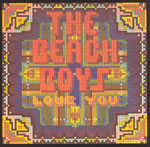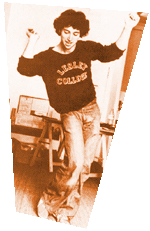If Earth Has Life On It
| |

|
To paraphrase Mr. Bangs in one of his more inspired rants about Uncle Lou, Brian Wilson is a loony and a headcase and everything people say he is. It is also most inconvenient for the mythmakers and pop-media pundits that he is still alive, having neither faded away nor assumed room temperature during one of his much-publicized periods of bedridden indolence. It is, however, a cause for rejoice and throwing confetti and small children high in the air to know that, not only is Brian Wilson alive, whinnying and when lucky, hitting those famed falsetto scales in the occasional live performance, but that there are still people in this sick old world having the light bulb of discovery come flashing above their bonces once the brilliance and timelessness of Brian's artistry connects with them. I am in agreement and then some with everything my esteemed colleague Mr. Fitchett has thus far said in the matter of certain vintage Beach Boys work, though I would also like to extend the Roger Ebert thumbs-up to other moments. Some have already been alluded to, those immediately post-Pet Sounds efforts that presented evidence that both Carl and especially Dennis Wilson were reaching for and occasionally even matched the artistic standard set by their older sibling. I'm thinking of Dennis' heart-melting ballad 'Forever' on Sunflower, itself foreshadowed on the earlier BB album Friends by such left-field Denny delights as 'Little Bird' and the spiritual hush and tremble of 'Be Still'. I also think of Carl on Surf's Up coming up with 'Long Promised Road' and the transcendent dreampop of 'Feel Flows'. Incidentally, the latter was used to great and amazingly unheralded effect in former rockcrit hack turned popcorn-double-feature auteur Cameron Crowe's Almost Famous. As the Beach Boys crept uneasily into the Seventies, though, one can be forgiven for wanting to write them off completely, given the albums immediately following Surf's Up. With hindsight, a pattern does seem to emerge in the pacing of the work from that time; a pair of marvelous flashes from either Brian or one of the brothers, book-ending some serious dead spots of forgettable tunes by the rest of the band. Then came the chart topping 'best of' collections Endless Summer and Spirit of America, which, while a financial shot in the arm, nonetheless froze the Beach Boys in the nostalgic and mythological amber - 'America's Band' - that remains impenetrable to this day. But what the hey - Brian was back, for the first time, anyway. The recent reissue series of the Beach Boys' Seventies output does, at least in one case - the twofer of 15 Big Ones and The Beach Boys Love You - puts into Joe Soap's hands a perfect representation of the duality of perception vs. reality as it existed circa 1976-77, the period immediately following the Endless Summer-generated resurgence in popularity. 15 Big Ones was a seemingly foolproof, if not especially substantial, product to capitalize on same, complete with prime-time TV special - "hey, we're back, we can still rock and harmonize, here's some oldies you might remember, and hey Brian, get outta bed and croak us a tune or two". To be fair, really, amidst the obvious pandering moves like the cover of 'Rock and Roll Music', there are again some glints of what made the Beach Boys special. 'It's OK' was of special interest to us Anglophiles, for the involvement - on some immediately recognizable sax blats and harmony vocals - of the great Roy Wood of Move/Wizzard infamy. A few of the cover songs were actually quite dandily reshaped - listen to how 'Palisades Park' seems to get louder and denser as it unfolds, and just try to not tear up at the drama invested in Carl Wilson's turn on the Righteous Brothers' 'Just Once In My Life', apparently a favorite of the gents from Kraftwerk! Even Dennis' gamy rasp of 'In The Still Of The Night' is quite endearing. |

|
Then we come to its reissue-package sibling, The Beach Boys Love You, second only to Smile as the group's cause celebre. No one who has heard it has a lukewarm opinion of this album; people either love it madly or passionately despise it. Looking back, it's quite heartwarmingly validating to note the arbiters of cool that raved about it upon its 1977 release: Nick Kent in the NME over here, Lester Bangs in the States. Most incongruous of all was the positive write-up given Love You by Patti Smith in the late, lamented Hit Parader - itself deserving of a retrospective, Hit Parader being one of only three mass-market US publications of that era, besides Creem and the photo-oriented Rock Scene, to openly champion the early New York and London underground music scenes. Hit Parader also harbored a stable of great writers, like the notorious gossip columnist and rock fashionista Lisa Robinson, Patti band-mate Lenny Kaye, even Richard Hell and Wayne/Jayne County for a time - not forgetting the intermittent, inimitable appraisal by La Smith of everything from Bowie's 'Heroes' to old Albert Ayler sides. As one might expect, such illustrious supporters were in the minority, as most rockcrits saw Love You as the final damning proof of Brian's irredeemable space-cadet state of mind, with its ditties about airplane flights, roller-skaters and TV chat show hosts. The public agreed, banishing it to bargain-bin purgatory (for a young Peter Buck to find, thereafter hoarding as many as he could to give as gifts) and bringing the commercial second wind the Beach Boys were enjoying to a screeching halt. More's the pity, for Love You was in truth the sound of Brian Wilson, ten years on from the epoch of Pet Sounds, gamely attempting another artistic hang-ten and coming near as damnit close, albeit in a more mentally delicate and musically scaled down fashion, and in even unfriendlier commercial waters to boot. In a perfect world, Love You would have been seen as the brave, force-of-will effort it was, putting Brian back on top again (seeing as how it was basically a solo effort in all but name, whether he would have included the rest of the band can only be speculated). Woulda, coulda, shoulda, or as Brian himself might have opined, "well oh my oh gosh oh gee". Speaking of wish-fulfillment fantasies, a more recent opinion posited Love You as an ultimate meeting of minds between Phil Spector and Jonathan Richman. Perfect! Nail on head! As with most of Brian's more inspired creations, Spector casts a long shadow over Love You, and not just the cheeky name-check he's paid on the song 'Mona'. The delicious complexity of the musical arrangements for songs like 'Solar System', 'Let Us Go On This Way', 'The Night Was So Young' - buoyed as ever by Brian's unflagging gift for layered, celestial harmonies - makes it quite apparent that, pared down from the days of Pet Sounds though it was, that Brian was still aiming for the grand, Wagnerian pop gesture, that he was still hearing the Wall Of Sound. Even if the reality was his basement home studio, even if he was resorting to the whir and gurgle of analog synthesizers to fill in for the long dispersed Wrecking Crew. So what if it makes an otherwise classic Beach Boys ballad like 'I'll Bet He's Nice' sound, indeed - as some anonymous scribe recently observed - like it was recorded in a video arcade; this only serves to apply another glossy layer of retroactive charm to the proceedings. |

|
The Richman comparison is also appropriate, not least of which for the coincidence of Love You coming out at the same time as Jojo's British performing debut, accompanied not by the brooding monochrome of the original Modern Lovers but by the sunny, low-volume pastoral bop of ML's Mark Two - causing many fans to believe that Richman, like Brian, had snapped his cap. Both shared a refreshing lyrical pop artlessness, unafraid of being thought of as whimsical or sentimental - or better, not even being aware that such things were to be feared in the context of pop music. It was a concept that, more likely by accident rather than design, was to be held in much regard with the advent of Punk, and one that resonates even now - I'm thinking here of Jad Fair, the Pastels, Stephin Merritt, just about everything on the K and Sarah labels. Plus, at their best both Richman and Wilson can be heart-stoppingly poignant, and terribly funny in equal measure - only Richman, and maybe the Ramones, could have come up with a song like 'Johnny Carson' , or rival the classic couplet in Love You's music-box-pretty astronomy primer 'Solar System', "If Mars has life on it/I might find my wife on it". I am loathe to give away too much regarding the delights to be found on Love You , except to say that, yes, some have dismissed it by saying its songcraft is ïna¥ve', which to me is the whole point - na¥ve, even childlike, yes, but also chockfull of spirit, with its messages of basic love and alienation, its lack of complex worldly wisdom, just good straightforward stuff put across with tremendous force and conviction...and, yes, train-spotters, that was a paraphrase from Warhol's POPism book, though a fitting one. For it is the recollections of an early Warhol booster as to what was most likely his first pop music concert, capturing beautifully and articulately the joy, the uplift that the best pop music can provide to sentient beings. (And what we love, we love repeated.) Music like that of, oh say, the Beach Boys and Jonathan Richman. As Alistair would say, "get the picture"? Of course, Love You was to be Brian Wilson's last great burst of creativity within the Beach Boys fold, portending the now-familiar descent into pharmaceutical bondage, psychological rehab - which may have been another form of bondage in itself - and near-gothic familial subterfuge. At the end of the day, though, we still have the music, something that ultimately, in defiance of the ravages of trends, tabloids and time - much like the miraculous unbowed sight of its creator, on the stage of the Royal Festival Hall and other venues just weeks ago - will stand. © Michael Layne Heath 2002 |